Ukraine Moves To Impose Sanctions On Iran

The Ukrainian government submitted a resolution to parliament on May 27 to impose 50-year-long sanctions on Iran, ostensibly for its supply of weapons to Russia.

The Ukrainian government submitted a resolution to parliament on May 27 to impose 50-year-long sanctions on Iran, ostensibly for its supply of weapons to Russia.
Ukrainian Pravda website reported on Sunday that the draft resolution by the National Security and Defense Council of Ukraine "On the application of sectoral special economic and other restrictive measures (sanctions) against the Islamic Republic of Iran,” was submitted to the legislature.
The resolution stipulates a complete trade ban, suspension of transit resources, flights and transportation and prevention of capital outflow by Iranian citizens.
Iran has supplied hundreds of Kamikaze drones to Russia that have been used to target mainly Ukrainian infrastructure and civilians since September 2022. Tehran has denied that it has sent any drones to Moscow since the invasion of Ukraine began in February 2022, but Kyiv has presented overwhelming material evidence showing Russia has used Iranian-made Shahed drones.
Ukraine’s air defenses have learned to shoot down the great majority of the drones, but some slip through anti-aircraft fire and hit civilian targets. A large attack by Iranian drones shook the capital Kyiv on Sunday.
The proposed sanctions package requires the Cabinet of Ministers, the Security Service, the Foreign Intelligence Service, the National Bank and other state authorities to implement and monitor the sanctions.
The document also proposes to prohibit any investment in Iran, transfer of technology and intellectual property rights by residents of Ukraine.
Kyiv also has an ongoing dispute with Tehran over the downing of a civilian airliner belonging to one of its airlines in January 2020 over Tehran by two IRGC missiles which resulted in the death of 176 people onboard. Iran has prevented a independent investigation and a clear report on the incident.
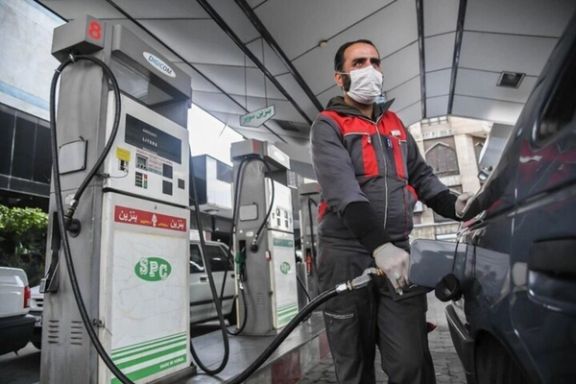
An Iranian official said Sunday that in addition to a limit on cheap gasoline for citizens, more expensive fuel will also be rationed, and limited to 150 liters per month.
Gasoline and other fuels are heavily subsidized in Iran, which coupled with refining limitations, has led to shortages this year according to the government.
In 2019, the government raised gasoline prices to 15,000 rials per liter, or less than 3 US cents in today’s exchange rates. At this price citizens were allowed to buy 60 liters per month, or 15.8 US gallons. But it sold unlimited gasoline at double the minimum price.
The new regulation caps the more expensive gasoline at 150 liters per individual, per month – or 40 gallons. The 60-liter allowance at the cheaper price remains in effect. Overall, gasoline, diesel and natural gas prices in Iran are among the lowest in the world.
Iran’s heavy fuel and electricity subsidies cost the country at least $50 billion a year, while the government struggles to secure foreign currencies amid US economic sanctions.
The government is entertaining the idea of raising fuel prices, but last time when it increased prices in 2019, fierce nationwide protests broke out. Government forces killed at least 1,500 people in one week and badly damaged the regime’s legitimacy.
Five years of economic crisis since the imposition of US sanctions have pushed annual inflation to near 70 percent and the national currency rial has lost its value 12-fold.
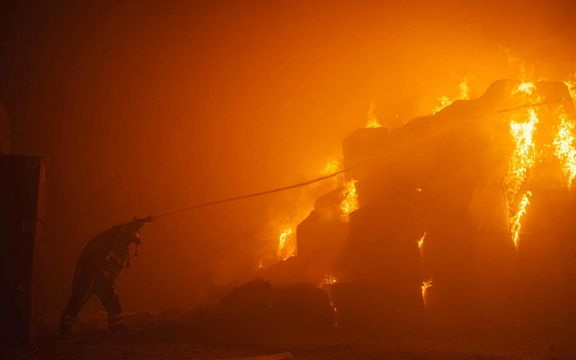
Russia unleashed waves of air strikes on Kyiv overnight in what officials said was the largest attack by Iranian drones on the city since the start of the war.
The Russian assault took place as the Ukrainian capital prepared to celebrate the anniversary of its founding on Sunday.
Russia has used hundreds of Iranian-made drones since September 2022 mostly against Ukrainian civilian targets, with stocks being re-plenished as Tehran denied providing the destructive weapon.
Ukraine's Air Force said it downed 52 out of the 54 drones, calling it a record attack with the Iranian-made Shahed 'kamikaze' drones. It was not immediately clear how many of the drones were shot over Kyiv.
In what also appears to be the first deadly attack on Kyiv in May and the 14th assault this month, falling debris killed a 41-year-old man, Mayor Vitali Klitschko said.
Ukrainian President Volodymyr Zelenskyy urged Iran on Wednesday to reconsider the supply of drones to Russia in order to stop a slide into "the dark side of history."
"The simple question is this: what is your interest in being an accomplice to Russian terror?" Zelenskyy said in his nightly video address.

"What is the benefit to Iran of such cynical killing? By Russian hands, but with your weapons, your weapons...Your Shaheds, which terrorize Ukraine every night, mean only that the people of Iran are being driven deeper and deeper into the dark side of history."
The pre-dawn attacks came on the last Sunday of May when the capital celebrates Kyiv Day, the anniversary of its official founding 1,541 years ago. The day is typically marked by street fairs, live concerts and special museum exhibitions - plans for which have been made this year too, but on a smaller scale.
"The history of Ukraine is a long-standing irritant for the insecure Russians," Andriy Yermak, the head of President Volodymyr Zelenskiy's office, said on his Telegram channel.
Air Force said on Telegram that Russia had targeted military and critical infrastructure facilities in the central regions of Ukraine, and the Kyiv region in particular.
With a Ukrainian counteroffensive looming 15 months into the war, Moscow has intensified air strikes after a lull of nearly two months. Waves of attacks now come several times a week.
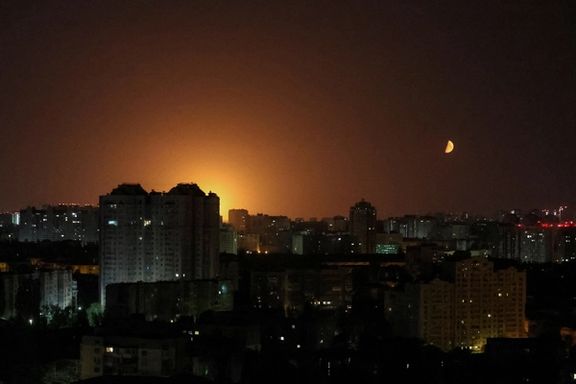
The Sunday attacks came after Kyiv said that combat clashes eased around the besieged city of Bakhmut in south-eastern Ukraine, the site of the war's longest battle.
Serhiy Popko, the head of Kyiv's military administration, said the attack was carried out in several waves, and air alerts lasted more than five hours.
"Today, the enemy decided to 'congratulate' the people of Kyiv on Kyiv Day with the help of their deadly UAVs (unmanned aerial vehicles)," Popko said on the Telegram messaging channel.
Several districts of Kyiv, by far the largest Ukrainian city with a population of around 3 million, suffered in the overnight attacks, officials said, including the historical Pecherskyi neighbourhood.
Witnesses said that during the air raid alerts that started soon after midnight, many people stood on their balconies, some screaming offensives directed at Russia's President Vladimir Putin and "Glory to air defence" slogans.
In the leafy Holosiivskyi district in the southwestern part of Kyiv, falling debris set a three-storey warehouse on fire, destroying about 1,000 square metres (10,800 square feet) of building structures, Mayor Klitschko said.
A fire broke out after falling drone debris hit a seven-storey non-residential building in the Solomyanskyi district west of the city. The district is a busy rail and air transport hub.
In the Pecherskyi district, a fire broke out on the roof of a nine-storey building due to falling drone debris, and in the Darnytskyi district a shop was damaged, Kyiv's military administration officials said on Telegram.
With reporting by Reuters
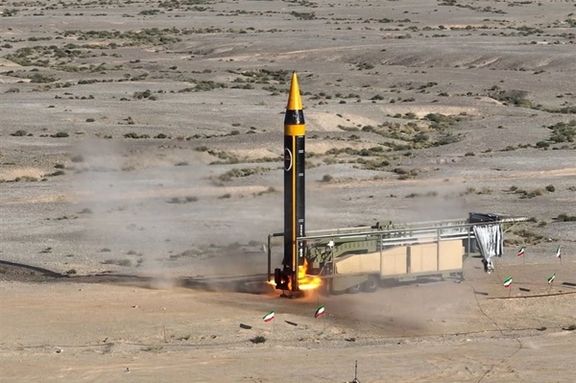
Fars news agency affiliated with the Revolutionary Guard Sunday described Iran’s new ballistic missile, Khorramshahr, as super-capable, and a response to Israeli threats.
Saying that the missile can carry a one-ton warhead, which can evade radar and is immune to air defenses, Fars added that Iran introduced the weapon amid Israeli threats of an attack.
Quoting Prime Minister Benjamin Netanyahu and other Israeli officials who have said Israel will do everything in its power to prevent Iran from acquiring nuclear weapons, Fars insisted that “it is the Zionists who constantly seek tensions.”
While the Islamic Republic is dangerously getting closer to the nuclear threshold, the United States has also repeatedly announced that “all options are on the table”. President Joe Biden has vowed not to allow Iran to acquire nuclear weapons.
Fars claimed that top Iranian officials have repeatedly announced that their goal is “peace and instability in the region.” However, Iran’s Islamic regime has constantly threatened Israel with attacks and destruction.
This year, Iranian officials openly called for more attacks by their proxy forces around Israel and to expand their operations, boasting of dozens of daily attacks.
Earlier this month, Iran International reported that the Iranian regime had urged the Palestinian Hamas militant group to join forces with the Islamic Jihad for a new round of attacks against Israel.
Gen. Mohammad-Reza Naghdi, deputy to IRGC's chief commander in April claimed that last year 10,000 attacks took place against Israel taking credit for standing behind what the regime calls “the resistance front.” Naghdi said, “This is the revenge of the Islamic Revolution; the destruction of the Zionist regime.”

Dadban, a group of pro-bono lawyers in Iran defending political prisoners and rights activists, has warned about the potential execution of three young men in Tehran.
In a report Friday, Dadban said the three young men – Milad Armoun, Mehdi Hosseini and Alireza Kafaei -- have been charged with Muhariba (pronounced moharebeh in Persian) for the killing of a 21-year-old Basiji militia member named Arman Aliverdi in Tehran’s Ekbatan neighborhood October 26 amid nationwide protests.
Muhariba is an Islamic-Arabic term that in the lexicon of the Iranian regime means bearing arms and “fighting God” or “waging war against God,” and carries the death penalty.
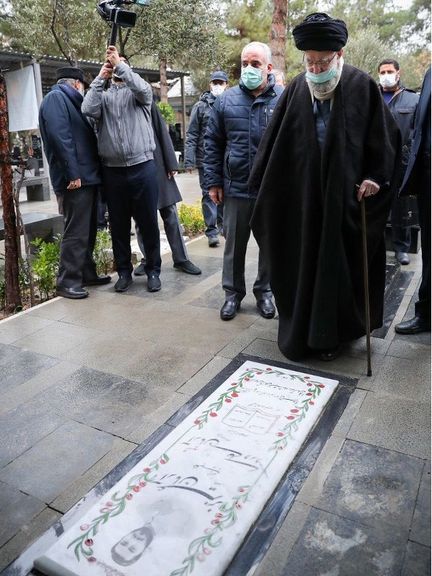
A video circulating on social media at the time showed Aliverdi bleeding from the face and head while a protester kicked him. He later died in hospital. Authorities claim protesters also stabbed him.
Defendants in the case have denied stabbing Aliverdi who the residents of Ekbatan say had been trying to infiltrate the protesters to identify their leaders.
A young woman, who identifies herself as Aidi and runs the neighborhood’s popular Twitter account, told Iran International that the case is still under investigation and the accused have not been sentenced yet.
According to Payam Dorfeshan who represents one of the defendants in the case, the accused were tortured to confess to Aliverdi’s killing and implicate each other, Dadban said.
It also reported three other defendants, Mehdi Hosseini, Hossein Nemati and another yet unnamed young man apparently arrested in Ahvaz recently, have been charged with “complicity in murder” and “propaganda against the regime”.
After the incident, security forces from various agencies carried out many raids in Ekbatan and arrested at least fifty young protesters. Fourteen of the detainees were eventually indicted but others were freed later for lack of any evidence of their involvement in Aliverdi’s killing.
Dadban quoted Dorfeshan as saying that security forces’ violent daytime and night raids in Ekbatan were meant to arrest defendants and other protesters and instill fear among the residents.
The west Tehran neighborhood was an epicenter of protests ignited by the death of Mahsa Amini, the 22-year-old woman who was fatally injured in September 2022 while in police custody following her arrest for not wearing “proper” hijab.
“These raids have seriously affected the mental health of the residents, particularly children.There are reliable reports about sleep disturbance and nightmares among children after these raids. Their drawings also show violent scenes as a result of [witnessing] the raids,” he said.
During the heat of the protests, Basij militiamen and officers of various intelligence and security forces in plainclothes attacked chanting young people who marched in small groups around the blocks of apartments in Ekbatan.
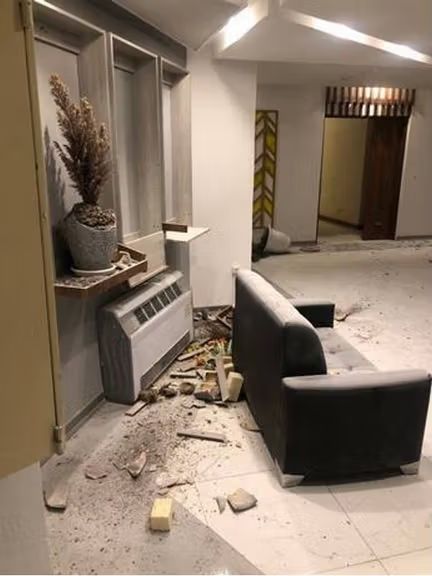
Basijis and other security forces on several occasions shot at people’s windows indiscriminately, rampaged the entrance lobbies in several blocks, broke the windows, and destroyed the lobby furniture and intercoms to give the residents a lesson.
The ever-present Basij have four bases within the five square kilometer complex which has 15,500 apartments and a population of around 45,000.
Regime forces often used tear gas, shot pellets at protesters for chanting “Death to Khamenei” and “Down with the Dictator” every night, and made arrests both outside and inside the buildings.
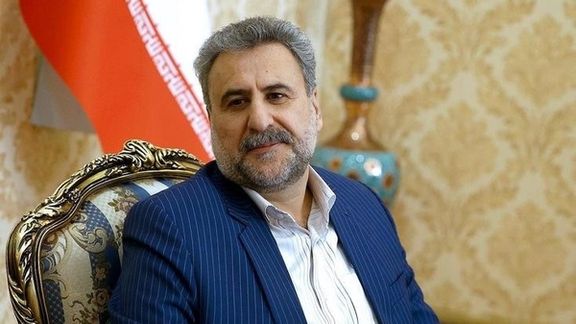
A prominent Iranian politician has blamed the inexperience of Iranian diplomats for tensions with the Taliban in Afghanistan and clashes at the border.
Heshmatollah Falahatpisheh, former head of Iranian parliament's National Security and Foreign Relations Committee said in an interview with Rouydad24 website on May 27 that "the most intimidated individuals in Iran's Foreign Ministry are in charge of ties with Afghanistan." He was probably referring, among others, to Hassan Kazemi Qomi, Iran's ambassador to Kabul.
The politician’s remarks were published on the same day when a serious border skirmish took place killing at least three people from both sides.
On May 25, Iran's Foreign Minister Hossein Amir Abdollahian was quoted as saying, "We are concerned about sporadic clashes at the border between Iran and Afghanistan during the past months."
Falahatpisheh told Rouydad24 that "Afghanistan has the upper hand in relations with Iran as Kabul uses a major part of Iran's share of water in the river Hirmand (Hilmand in Afghanistan) for poppy cultivation, a plant from which Afghans extract opium." Falahatpisheh said that the Taliban's annual income from selling narcotics is more than what Iran spends on developmental projects during the year.
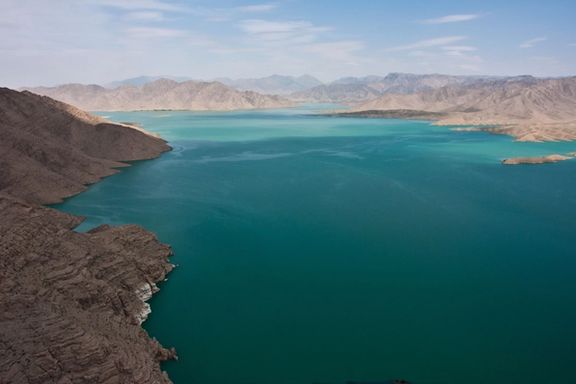
Meanwhile, he criticized Iran's "intimated" diplomats who have handed over Afghanistan's embassy in Tehran to the Taliban although Iran officially does not recognize their regime in Afghanistan as the country's government. Amir-Abdollahian said two days before the latest clash at the border that Iran does not recognize the current Taleban ruling council in Afghanistan, adding that Iran calls for forming a broad-based government in Afghanistan, and that "the Taliban are only a part and not all of the political reality of Afghanistan. We are unhappy about Afghan girls being deprived of education and see this as a behavior which is against the teachings of the prophet of Islam."
Falahatpisheh also blamed Iran's problematic regional diplomacy during the past seven years as another indication of the Foreign Ministry's inefficiency. He was referring to the attacks on the Saudi embassy in Iran in January 2016, which adversely affected not only ties between Tehran and Riyadh, but also Iran's relations with many other regional countries. He said that the development weakened Iran's bargaining power in the region.
He expressed regret that those who ruined Iran's regional relations seven years ago have still maintained their influence on the country's foreign policy as “infiltrators” in the Iranian government. He warned that a new crisis may occur at any moment because of those infiltrators. He did not explain what he meant by ‘infiltrators’.
Falahatpisheh said that no review of that period in Iran's foreign relations have been done, so no lessons have been learned. He warned that the excesses by some Iranian officials is manifested in the new episode in Iran's ties with Afghanistan. "The same individuals who called the Taliban "our Mojahed brothers" are now taking radical stances against Afghanistan.
Some Iranian media and clerics, most prominently Masih Mohajeri, the editor in chief of Jomhouri Eslami newspaper warned officials about their premature friendliness toward the Taliban immediately after their takeover of Afghanistan.
Falahatpisheh pointed out that during the past two years, only 4 million cubic meters of water was released from Afghanistan into the Hirmand rather than Iran's 8.5 million cubic meter share based on a 1973 agreement between the two countries. He said even most of that water arrived in Iran because of floods without the Taliban having any control over the flow.
The politician suggested that Iran should take a realistic stance against Afghanistan and cut off the Taliban's profit from the smuggling of narcotics into Iran, adding that Iran's anti-narcotics campaign has never been effective.
Meanwhile, he pointed out that Tehran's weakened position on the international scene has turned even small regional players such as the Taliban into major threats for Iran.